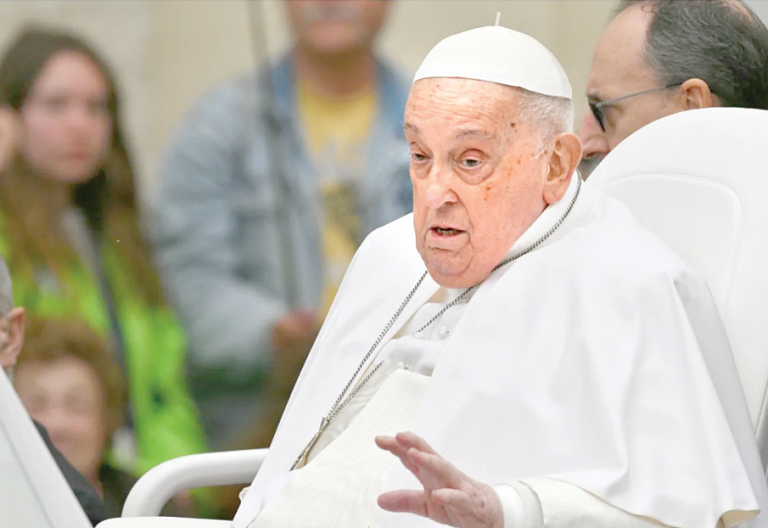Argentine bouncer who became hope of marginalised world
By Faith Macharia, April 22, 2025Born Jorge Mario Bergoglio on December 17, 1936, in Buenos Aires, Argentina, Pope Francis has become one of the most influential and transformative leaders of the Roman Catholic Church in the modern era. He was the first pontiff from the Americas and the Southern Hemisphere, in a journey that was marked with humility and compassion, from a humble Jesuit priest in Argentina to the Bishop of Rome.
Jorge Mario Bergoglio was the eldest of five children in a family of Italian immigrants. His father, Mario Bergoglio, worked as a railway accountant, and his mother, Regina Sivori, was a homemaker.
Young Bergoglio joined the Society of Jesus, the Jesuits, in 1958, drawn by their commitment to education, service, and missionary work. After 13 years of training, he was ordained a priest in 1969 and rose through the ranks, eventually becoming the provincial superior of the Jesuits in Argentina during a turbulent period of political unrest and dictatorship.
Embracing simplicity
Pope John Paul II appointed Bergoglio as an auxiliary bishop of Buenos Aires in 1992. By 1998, he became the Archbishop of the city. As archbishop, he focused on humility and shunned the luxurious bishop’s palace for a simple apartment and was known for riding public buses, cooking his own meals and ministering to the poor in the slums.
His pastoral style emphasised simplicity, humility, and a direct connection with the marginalised. Even as he rose in church leadership, he remained deeply rooted in the lives of ordinary people.
On March 13, 2013, following the resignation of Pope Benedict XVI, Cardinal Bergoglio was elected as the 266th pope of the Roman Catholic Church. He was the first pope to take the name Francis, after St. Francis of Assisi, the patron saint of the poor and the environment, he signalled from the start, he focused on humility, reform, and compassion.
The election of Pope Francis broke several precedents since he was the first Jesuit pope, the first pope from the Americas, and the first non-European pope in over 1,200 years.
As Pope, Francis focused on several issues on social justice, climate change, interfaith dialogue, and internal church reform. He championed the plight of refugees, spoken boldly on economic inequality, and criticised unfettered capitalism as a system that “kills.”
In 2015, he published Laudato Si’, an encyclical on environmental care, commending global action on climate change. His emphasis on ecological responsibility earned praise from both religious and secular leaders worldwide.
Within the Church, Pope Francis pushed for greater transparency in Vatican finances, addressed the sexual abuse crisis with more direct language than many of his predecessors, and opened conversations on previously taboo subjects, such as divorce and the role of women.
Inclusive Pope
Pope Francis faced a lot of criticism especially among traditionalists who saw his reforms as too radical, he was largely embraced as a figure of hope and openness in a world grappling with division and uncertainty.
Beyond doctrine, Pope Francis redefined what it meant to be a spiritual leader in the 21st century. He visited war zones, washed the feet of prisoners, met with homeless people, and extended hands to leaders of other faiths from rabbis to imams advocating peace and coexistence.
He notably played a role in restoring diplomatic relations between the United States and Cuba and has consistently advocated for peace in conflict areas like Syria, Ukraine, and the Holy Land.
Even in his later days, when he used a wheelchair due to knee problems, Pope Francis continued to lead with energy and compassion. He hinted at the possibility of resignation, following the precedent set by Pope Benedict XVI, but remained actively engaged in global and church affairs. In fact, on Easter Sunday, less than a day before his death the pontiff celebrated Mass and met with JD Vance, the U.S vice president.
To many, Pope Francis was not just a pope, but a symbol of moral clarity and kindness in an era often marked by division. Whether blessing a child with disabilities or standing up for indigenous rights, his papacy continues to be defined by an unwavering commitment to the dignity of every human being.
From the streets of Buenos Aires to the halls of the Vatican, Pope Francis’s journey was one of faith, service, and profound humility making him, in the eyes of many, a pope truly for the people.
The Pope’s closeness to those who suffer and his advocacy for an end to global violence were always a priority. Even in moments of personal difficulty, Pope Francis remained committed to peace.
In his final weeks, throughout his hospitalization for bilateral pneumonia, Pope Francis took the time to video chat with the Holy Family parish in Gaza, with whom he has been in close contact throughout the entirety of the Israeli offensive.
In this Holy Year dedicated to Hope, Pope Francis’ messages, closeness, and care for peace are a legacy that will continue to resonate throughout the future of the Church and humanity, remembering that his was not just a cry for an absence of war, but for the presence of justice, dialogue, and fraternity – for a world that is for everyone and not just for some, and in which those who have more never, ever forget those who have less.
